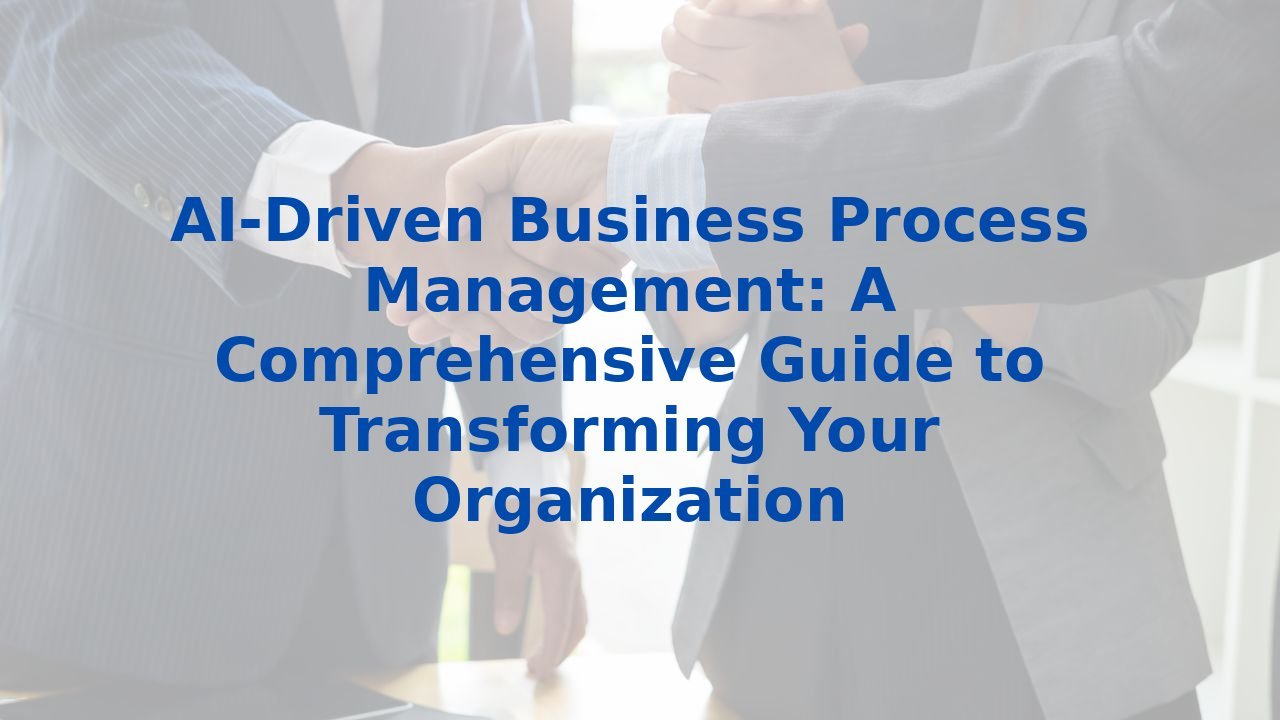AI-Driven Business Process Management: A Comprehensive Guide to Transforming Your Organization
AI-Driven Business Process Management: A Comprehensive Guide to Transforming Your Organization
In today’s fast-paced business landscape, the urgency to optimize operations is greater than ever. Enter Artificial Intelligence (AI), a game-changer that has begun to reshape the realms of Business Process Management (BPM). In this guide, we'll uncover how AI can enhance crucial business processes, paving the way for heightened efficiency and effectiveness within organizations.
The Evolution of Business Process Management
For decades, BPM has stood as a fundamental pillar of organizational efficiency. It embodies the systematic management of processes aimed at refining their effectiveness and adaptability. Traditionally, BPM has leaned on manual input and primitive methods to analyze and improve workflows. However, the advent of AI has ushered in a new era, marking a transformational shift that redefines how businesses can operate.
How AI Enhances Business Processes
AI has the potential to revolutionize BPM through automation and optimization across various operational aspects. Let’s explore the key ways AI is making a marked impact on business processes.
Process Discovery
Process discovery is critical for identifying inefficiencies that may stay hidden from traditional analyses. With the aid of process mining, pattern recognition, and natural language processing, AI unearths existing workflows within an organization. By analyzing extensive datasets quickly, AI provides a comprehensive overview of processes, helping to pinpoint areas that need attention.
Process Mapping
Once discovery is complete, AI takes a step further by creating detailed process maps. These visual depictions are essential for identifying interlinked workflows and spotting bottlenecks. By employing machine learning and data analytics, AI illustrates where inefficiencies may exist and keeps process documentation perpetually current.
Process Automation
One of the most profound transformations occurs with AI-powered automation. By utilizing AI bots, businesses can now automate previously manual tasks, such as handling vacation requests and processing invoices. This not only accelerates operational speed but also curtails costs and diminishes the potential for human errors, enhancing overall organizational performance.
Process Management
After creating process maps, AI continues to play a role in managing day-to-day operations. AI-powered monitoring tools can track Key Performance Indicators (KPIs), alerting managers to potential concerns. This real-time oversight ensures that organizations can intervene swiftly when challenges arise, fostering smoother and more efficient processes overall.
Process Improvement
The power of AI shines through its capacity for process improvement. By leveraging predictive modeling, root cause analysis, and data-driven insights, AI can foster sustainable enhancements. It analyzes historical data to recognize patterns and suggest optimal decision-making pathways, allowing decision-makers to reduce risks and make more informed choices.
The Benefits of AI in BPM
Integrating AI into BPM sprinkles a plethora of benefits on organizations:
- Improved Efficiency: AI automates repetitive tasks, allowing human resources to pivot towards strategic and creative endeavors.
- Enhanced Decision Making: AI empowers organizations with data-driven insights, yielding better decision-making and predictive capabilities.
- Real-Time Monitoring: The ability for instant oversight on processes allows for immediate interventions when challenges arise.
- Cost Reduction: With automation minimizing manual errors and saving time, organizations can realize significant cost savings.
The Importance of Employee Training
While the capabilities of AI are extensive, the effectiveness of these technologies relies significantly on the competencies of the people behind them. Training employees to harness AI strategically is paramount. Here's why:
- Understanding AI Capabilities: Employees must have a clear grasp of AI’s functionalities—what it can and cannot do—to maximize its utility.
- Data Quality: It's vital for employees to recognize the importance of accurate data. High-quality data is essential for training reliable AI models.
- Collaboration: Training fosters collaborative skills, enabling employees to work alongside AI and leverage both human and artificial intelligence effectively.
Investing in comprehensive training for your workforce is not just beneficial—it's essential. By equipping your entire workforce with AI skills, organizations can tap into the full potential of AI-driven BPM, ensuring both immediate wins and long-term sustainability.
Conclusion
The integration of AI in BPM is not merely a trend; it's a seismic shift in how organizations can enhance their efficiency and effectiveness. By adopting AI in process discovery, mapping, automation, management, and improvement, businesses can streamline their operations and accelerate decision-making. Moreover, nurturing your employees with essential AI training will unlock even greater potential, enabling your organization to thrive in an ever-evolving business environment.
To dive deeper into the realm of AI and equip yourself with the necessary skills, explore resources available on Complete AI Training.



